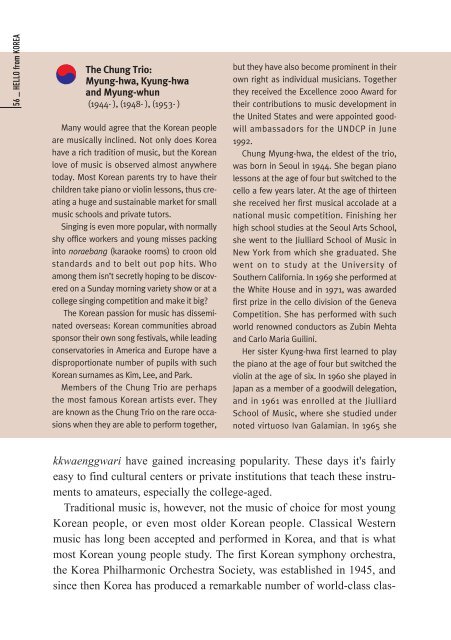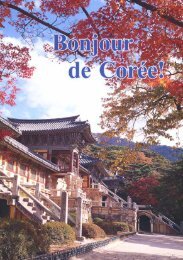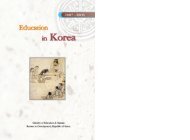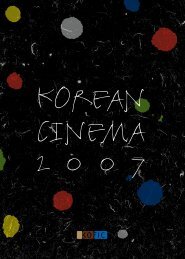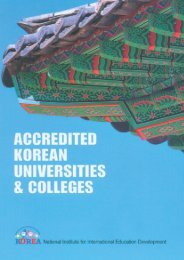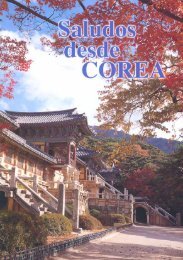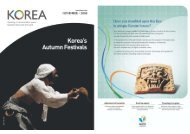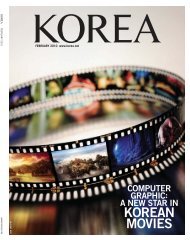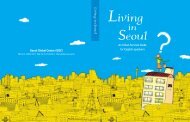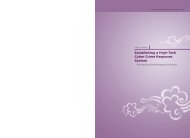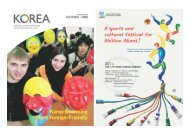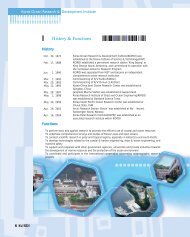HELLO from KOREA
Hello-Eng(3.3) - Korea.net
Hello-Eng(3.3) - Korea.net
- No tags were found...
Create successful ePaper yourself
Turn your PDF publications into a flip-book with our unique Google optimized e-Paper software.
56 _ <strong>HELLO</strong> <strong>from</strong> <strong>KOREA</strong><br />
The Chung Trio:<br />
Myung-hwa, Kyung-hwa<br />
and Myung-whun<br />
(1944- ), (1948- ), (1953- )<br />
Many would agree that the Korean people<br />
are musically inclined. Not only does Korea<br />
have a rich tradition of music, but the Korean<br />
love of music is observed almost anywhere<br />
today. Most Korean parents try to have their<br />
children take piano or violin lessons, thus creating<br />
a huge and sustainable market for small<br />
music schools and private tutors.<br />
Singing is even more popular, with normally<br />
shy office workers and young misses packing<br />
into noraebang (karaoke rooms) to croon old<br />
standards and to belt out pop hits. Who<br />
among them isn’t secretly hoping to be discovered<br />
on a Sunday morning variety show or at a<br />
college singing competition and make it big?<br />
The Korean passion for music has disseminated<br />
overseas: Korean communities abroad<br />
sponsor their own song festivals, while leading<br />
conservatories in America and Europe have a<br />
disproportionate number of pupils with such<br />
Korean surnames as Kim, Lee, and Park.<br />
Members of the Chung Trio are perhaps<br />
the most famous Korean artists ever. They<br />
are known as the Chung Trio on the rare occasions<br />
when they are able to perform together,<br />
but they have also become prominent in their<br />
own right as individual musicians. Together<br />
they received the Excellence 2000 Award for<br />
their contributions to music development in<br />
the United States and were appointed goodwill<br />
ambassadors for the UNDCP in June<br />
1992.<br />
Chung Myung-hwa, the eldest of the trio,<br />
was born in Seoul in 1944. She began piano<br />
lessons at the age of four but switched to the<br />
cello a few years later. At the age of thirteen<br />
she received her first musical accolade at a<br />
national music competition. Finishing her<br />
high school studies at the Seoul Arts School,<br />
she went to the Jiulliard School of Music in<br />
New York <strong>from</strong> which she graduated. She<br />
went on to study at the University of<br />
Southern California. In 1969 she performed at<br />
the White House and in 1971, was awarded<br />
first prize in the cello division of the Geneva<br />
Competition. She has performed with such<br />
world renowned conductors as Zubin Mehta<br />
and Carlo Maria Guilini.<br />
Her sister Kyung-hwa first learned to play<br />
the piano at the age of four but switched the<br />
violin at the age of six. In 1960 she played in<br />
Japan as a member of a goodwill delegation,<br />
and in 1961 was enrolled at the Jiulliard<br />
School of Music, where she studied under<br />
noted virtuoso Ivan Galamian. In 1965 she<br />
kkwaenggwari have gained increasing popularity. These days it's fairly<br />
easy to find cultural centers or private institutions that teach these instruments<br />
to amateurs, especially the college-aged.<br />
Traditional music is, however, not the music of choice for most young<br />
Korean people, or even most older Korean people. Classical Western<br />
music has long been accepted and performed in Korea, and that is what<br />
most Korean young people study. The first Korean symphony orchestra,<br />
the Korea Philharmonic Orchestra Society, was established in 1945, and<br />
since then Korea has produced a remarkable number of world-class clas-


